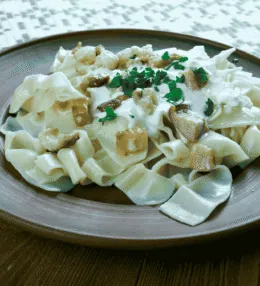
- View
Table of Contents
ToggleSalata od Hobotnice is a dish that instantly evokes the Adriatic coast. Freshly cooked octopus, tender and delicately flavoured, is sliced and combined with olive oil, vinegar, onions, and parsley. The result is refreshing and vibrant, a dish that feels like summer on a plate.
Served chilled, it offers balance between richness and lightness. The octopus is meaty yet soft, while the dressing brings acidity and freshness. It is a salad that works equally well as a starter at seaside taverns or as a centrepiece in family gatherings.
This dish embodies the Croatian relationship with the sea. It is simple in presentation yet layered in taste, reflecting a tradition where seafood is treated with respect and prepared in ways that highlight natural flavour rather than masking it.
Want to dive deeper into Croatian Cuisine? Don’t miss our post on Traditional Croatian Foods to Try
What Is Salata od Hobotnice?
Salata od Hobotnice is a classic Croatian salad made from boiled octopus, sliced into pieces and dressed with a mixture of olive oil, vinegar or lemon juice, garlic, onions, and fresh herbs. It is usually served cold, often after time spent marinating.
The salad is versatile. Some prefer to add potatoes for extra body, while others keep it pared back to emphasise the octopus itself. In coastal areas, it is common to see it paired with crusty bread and a glass of local white wine.
It is not a complicated dish, but its success depends on quality ingredients and careful preparation. The octopus must be cooked slowly until tender, otherwise the salad loses its charm. Done correctly, it becomes a dish worth lingering over.
Ingredients and Taste
The centrepiece is octopus, usually caught in the Adriatic and prized for its clean flavour. It is simmered gently with bay leaves, peppercorns, and sometimes wine corks, which are believed to help tenderise the flesh during cooking.
Once cooled, the octopus is sliced into bite sized pieces and combined with finely chopped onions, garlic, parsley, and a dressing of olive oil and vinegar or lemon. The freshness of the herbs lifts the dish, while the acidity cuts through the richness.
The taste is clean and refreshing. The octopus has a mild, slightly sweet flavour, while the dressing adds sharpness and brightness. A drizzle of good olive oil ties everything together, leaving a smooth and well-rounded finish.
A Taste of History
Octopus salad is rooted in Croatia’s long history of living from the sea. Fishing has always been central to coastal communities, and octopus was valued for being abundant, versatile, and easy to preserve once cooked.
The dish became particularly popular in Dalmatia, where summer gatherings often featured it as part of a wider spread of seafood. It suited the Mediterranean climate, providing something cool and nourishing during hot afternoons.
Its preparation also reflects the Croatian approach to food. There is an emphasis on using what the sea provides, enhancing it with local olive oil, home grown herbs, and a touch of acidity. The dish is about balance and respect for ingredients.
Today, Salata od Hobotnice is found in restaurants from Istria to Dubrovnik. While every region and family may have its own slight variation, the essence remains the same. It is a dish that continues to bring the taste of the Adriatic to the table.
More than a recipe, it is part of Croatia’s identity. To eat it is to taste a piece of coastal life, shaped by centuries of tradition and an enduring love for the sea that defines so much of the country’s cuisine.
How to Make Salata od Hobotnice (Octopus Salad)
Salata od Hobotnice is a beloved dish along Croatia’s Adriatic coast, served chilled with olive oil, garlic, parsley, and fresh vegetables. Expect tender octopus, bright Mediterranean flavours, and a refreshing balance ideal for summer meals. See the recipe card at the bottom for printable directions
Ingredients
For the salad
- 1.2 kg fresh octopus, cleaned
- 2 bay leaves
- 1 small onion, halved
- 1 lemon, halved
- 3 garlic cloves, finely chopped
- 80 ml extra virgin olive oil
- 3 tbsp white wine vinegar
- 1 red onion, thinly sliced
- 200 g cherry tomatoes, halved
- 2 tbsp fresh flat leaf parsley, finely chopped
- Salt and freshly ground black pepper, to taste
For serving
- Lemon wedges
- Crusty bread
Cooking Instructions
Step 1: Prepare the octopus
To begin, clean the octopus thoroughly under cold water if not pre-cleaned. Remove the beak and rinse out the head cavity. Pat dry with kitchen paper. Move on to tenderising.
Step 2: Tenderise the octopus
Traditionally, octopus is tenderised by pounding lightly with a meat mallet or rolling pin. This helps relax the muscle fibres. If buying frozen octopus, thawing achieves a similar effect. Transition to boiling.
Step 3: Boil the octopus
In a large pot, bring water to a boil with bay leaves, halved onion, and lemon. Lower the octopus into the pot three times (dip and lift quickly) before submerging fully. This trick curls the tentacles neatly. Continue to simmer gently for 40–50 minutes until tender.
Step 4: Cool the octopus
Remove the octopus from the pot and allow it to cool in its cooking liquid for 15 minutes. This step helps retain tenderness and prevents the flesh from seizing. Proceed to chopping.
Step 5: Chop the octopus
Cut the tentacles into bite sized rounds and slice the head into thin strips. Discard any tough parts. Place the pieces in a large bowl ready for dressing.
Step 6: Prepare the dressing
In a separate bowl, whisk together olive oil, white wine vinegar, chopped garlic, salt, and pepper. Taste and adjust acidity with more vinegar if preferred. Transition to assembling.
Step 7: Assemble the salad
Add sliced red onion, cherry tomatoes, and parsley to the octopus. Pour over the dressing and toss gently to coat every piece evenly. Rest for flavour to develop.
Step 8: Chill before serving
Cover and refrigerate the salad for at least 30 minutes. This allows the flavours to meld beautifully while keeping the octopus firm yet juicy. Transition to garnishing.
Final Step: Serve the salad
Serve the chilled octopus salad with lemon wedges and crusty bread. Presentation tip: garnish with extra parsley for colour. Pairs well with crisp white wine for a complete Dalmatian experience.
Variations and Substitutions
- Substitute white wine vinegar with red wine vinegar for a deeper flavour.
- If octopus is hard to source, squid can be used though the texture will be slightly firmer.
- Replace cherry tomatoes with diced cucumber for a lighter variation.
- Add capers or black olives for extra briny depth.
Cooking Tips for Perfect Salata od Hobotnice
- Frozen octopus often turns out more tender than fresh due to natural breakdown of fibres.
- Simmer gently rather than boiling hard to avoid rubbery texture.
- Allowing octopus to cool in its cooking liquid keeps it moist.
- Chill before serving for the most refreshing taste and proper melding of flavours.

Salata od Hobotnice (Octopus Salad)
Ingredients
For the salad
- 1.2 kg fresh octopus cleaned
- 2 bay leaves
- 1 small onion halved
- 1 lemon halved
- 3 garlic cloves finely chopped
- 80 ml extra virgin olive oil
- 3 tbsp white wine vinegar
- 1 red onion thinly sliced
- 200 g cherry tomatoes halved
- 2 tbsp fresh flat leaf parsley finely chopped
- Salt and freshly ground black pepper to taste
For serving
- Lemon wedges
- Crusty bread
Instructions
- To begin, clean the octopus thoroughly under cold water if not pre-cleaned. Remove the beak and rinse out the head cavity. Pat dry with kitchen paper. Move on to tenderising.
- Traditionally, octopus is tenderised by pounding lightly with a meat mallet or rolling pin. This helps relax the muscle fibres. If buying frozen octopus, thawing achieves a similar effect. Transition to boiling.
- In a large pot, bring water to a boil with bay leaves, halved onion, and lemon. Lower the octopus into the pot three times (dip and lift quickly) before submerging fully. This trick curls the tentacles neatly. Continue to simmer gently for 40–50 minutes until tender.
- Remove the octopus from the pot and allow it to cool in its cooking liquid for 15 minutes. This step helps retain tenderness and prevents the flesh from seizing. Proceed to chopping.
- Cut the tentacles into bite sized rounds and slice the head into thin strips. Discard any tough parts. Place the pieces in a large bowl ready for dressing.
- In a separate bowl, whisk together olive oil, white wine vinegar, chopped garlic, salt, and pepper. Taste and adjust acidity with more vinegar if preferred. Transition to assembling.
- Add sliced red onion, cherry tomatoes, and parsley to the octopus. Pour over the dressing and toss gently to coat every piece evenly. Rest for flavour to develop.
- Cover and refrigerate the salad for at least 30 minutes. This allows the flavours to meld beautifully while keeping the octopus firm yet juicy. Transition to garnishing.
- Serve the chilled octopus salad with lemon wedges and crusty bread. Presentation tip: garnish with extra parsley for colour. Pairs well with crisp white wine for a complete Dalmatian experience.
Nutrition
You May Also Like











Leave a Review